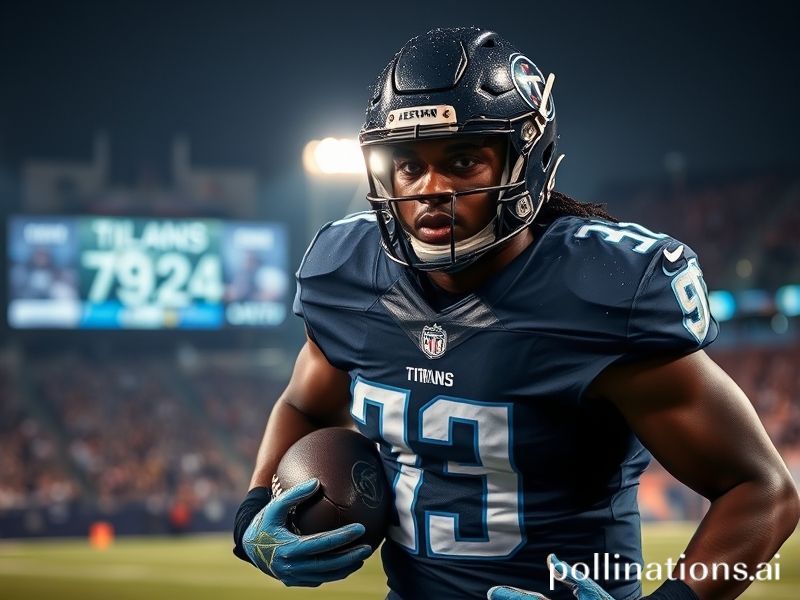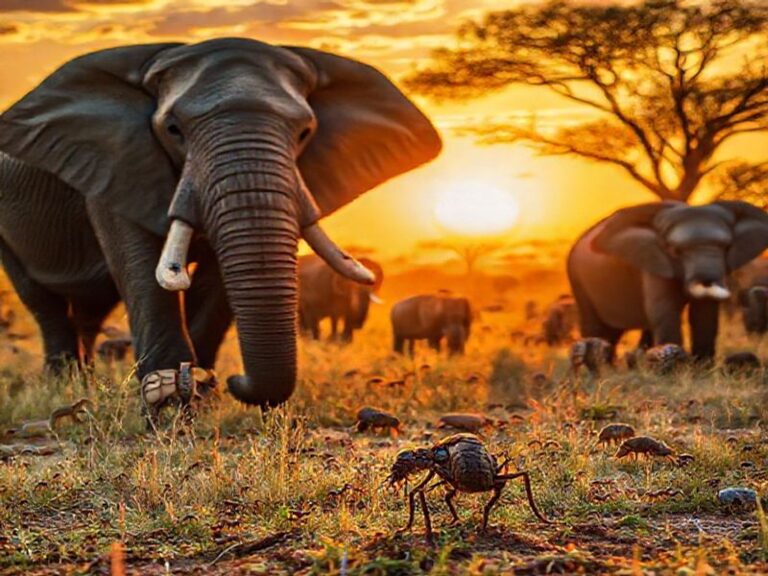Derrick Henry: The Last Global Running Back Running Over Modernity Itself
Derrick Henry Is the Last Titan Standing While the World Runs Out of Running Backs—and Possibly Civilization Itself
YULIN, CHINA—At 4:07 a.m. local time, while most of humanity was doom-scrolling about the next micro-war or the price of eggs, a 6-foot-3, 247-pound American running back named Derrick Henry was bench-pressing Buicks somewhere in Nashville. The clip surfaced on Weibo within minutes, overlaid with Mandarin subtitles that translated “truck stick” as “freight-train forearm.” Halfway across the planet, the French sports daily L’Équipe ran the headline “HENRY, HOMME-PIERRE QUI ROULE,” which sounds like existential poetry until you realize it just means “Henry, Stone-Man Who Rolls.” Even the Germans—who normally reserve superlatives for midfielders and industrial policy—grudgingly conceded the man is “sehr präzise, sehr brutal.”
In an era when the NFL exports its product like a slightly guiltier version of the opium trade, Henry is the rare commodity that still feels handmade. He runs upright, old-school, like a Depression-era farmer who’s just been told the bank took the tractor. Defenders bounce off him the way world leaders bounce off climate summits: with great initial enthusiasm and zero follow-through. The symbolism is almost too neat: in a league pivoting to delicate, data-drafted quarterbacks who throw 50 times a game, Henry remains a blunt instrument—part battering ram, part metaphor for a world that keeps trying to finesse its way out of problems that require blunt instruments.
GLOBAL RIPPLE EFFECTS, BECAUSE WHY NOT
When Henry stiff-armed Buffalo’s Josh Norman into a low-earth orbit last season, the GIF reached the top of r/soccer within 20 minutes. European fans debated whether Henry could survive 90 minutes against Atletico Madrid’s back line; South American fans countered that he’d be hacked to pieces by a Uruguayan youth coach before halftime. Meanwhile, in Lagos, a streetwear label dropped a limited-edition bomber jacket featuring Henry’s silhouette imposed over a 1970s map of the Trans-African Highway—retail $350, sold out in 11 minutes. Apparently nothing says pan-African ambition quite like an Alabama-born freight train in cleats.
The truly international angle isn’t merchandise; it’s scarcity. Running backs who matter are now rarer than bipartisan legislation. From Tokyo to Tegucigalpa, youth coaches preach “positionless football,” by which they mean everyone should aspire to be a quarterback who moonlights as a TikTok influencer. The pipeline that once produced Paytons and Campbells now produces gadget players who look great in 7-on-7 shorts and disappear the moment a rainy Tuesday in Green Bay demands actual intestinal fortitude. Henry is the last living argument that sometimes the best answer to modernity is to lower your helmet and ruin a perfectly good shoulder pad.
GEOPOLITICAL IRONY, BECAUSE WE’RE PROFESSIONALS
Consider the supply chain: Henry’s titanium facemask forged in South Korea, his gloves stitched in Vietnam, his playbook printed on Canadian paper. He is globalization’s Frankenstein, assembled from the Pacific Rim and pointed downhill at 21 miles per hour. And yet the man himself is stubbornly local—Yulee, Florida, population 12,888, a town whose Wikipedia page still lists “Timucuan artifacts” as a notable feature. Every Sunday, Henry carries the hopes of a town that hasn’t had a new high school since the Clinton administration, while simultaneously subsidizing the pension funds of defensive backs he just retired. If that’s not late-stage capitalism performing interpretive dance, nothing is.
THE END IS NIGH, BUT FIRST A PLAY-ACTION FAKE
Football, like democracy and the McRib, is marketed worldwide as uniquely American yet somehow universally relevant. Henry embodies that contradiction: he is both the product and the protest. Watch him on any given Sunday and you see the last gasp of a dying position, a man running against the spreadsheet, against the spread offense, against the creeping feeling that we’ve all agreed to trade physical reality for augmented reality. He is, in short, the perfect avatar for 2024: too large to ignore, too direct for nuance, and still somehow powerless to stop the larger forces that will eventually grind him down like everything else.
When that day comes—when Henry finally limps off the field, his cleats smoking like a crashed drone—rest assured the headlines will be global. Le Monde will sigh, the BBC will run a tasteful montage, and somewhere in Shenzhen a factory will already be prototyping the next lightweight carbon-fiber replacement. And the world will keep spinning, slightly faster now that the heaviest man on it has stopped running.
But until then, savor the blunt-force poetry. In an age of curated feeds and soft power, Derrick Henry remains hard power incarnate—an un-subtle reminder that sometimes, when everything else fails, you just have to lower your shoulder and hope the other guy regrets it more than you do.







